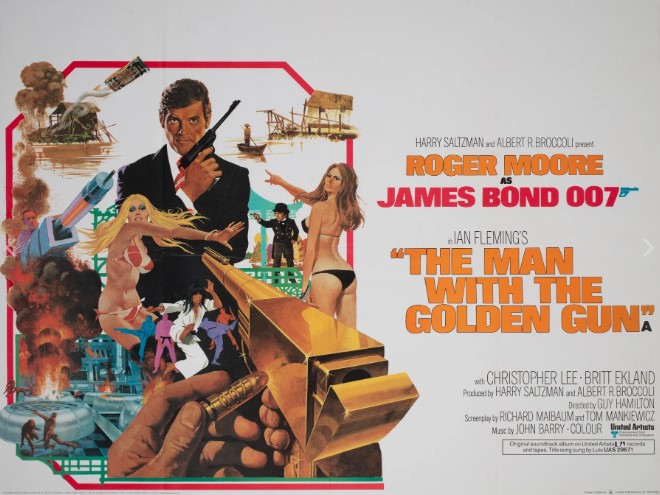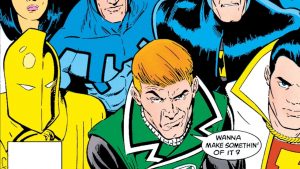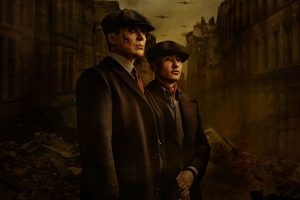
Dr. No, From Russia With Love, Goldfinger, Thunderball, You Only Live Twice, On Her Majesty’s Secret Service, and Diamonds Are Forever saw the role of James Bond change hands several times. Then Sir Roger of Moore landed with a three-movie contract and a promise of stability. His first movie, Live And Let Die, was a smash hit, so things looked good for 007. For Eon’s next movie, they pushed ahead with an adaption they had tried to get off the ground several times – The Man With The Golden Gun. Little did the producers know, there were still troubled waters ahead…
The Man With The Golden Gun – Behind The Scenes
The Man With The Golden Gun was nearly made multiple times. On several occasions, producers Albert R. Broccoli and Harry Saltzman circled Fleming’s final novel. When Connery walked away from the franchise after You Only Live Twice, they actually offered Roger Moore the role and planned to make The Man with the Golden Gun next.
Filming was scheduled in Cambodia and locations were set. Then Moore’s commitments to The Saint kept him tied up, plus the Samlaut Uprising took Cambodia off the table. Production was canceled. Lazenby was then cast as Bond, and On Her Majesty’s Secret Service was made instead. Lazenby’s next Bond film, Saltzman told a reporter, would be either The Man with the Golden Gun or Diamonds Are Forever. However, as we all know, Lazenby resigned as Bond to grow long hair and sing kumbaya, and Connery returned for one last fling as 007 in Diamonds Are Forever.
When United Artists greenlit another James Bond film after viewing dailies of Moore in Live and Let Die, Broccoli and Saltzman finally got their chance to make The Man With The Golden Gun. It continued the trend, starting with You Only Live Twice, of the movies having little in common with the books, outside of the title and a few characters. The Man With The Golden Gun novel is set mostly in Jamaica and features a Soviet proxy harming British agricultural interests in the Caribbean.
Frequent Bond writer Tom Mankiewicz wrote the first draft of the script in 1973. This script focused on a battle of wills, and skills, between Bond and Scaramanga, with Scaramanga set up as Bond’s evil alter-ego. While in Thailand, Mankiewicz and Saltzman also witnessed elephants working in the teak forests. Saltzman was inspired and told Mankiewicz, “This will work great for the elephant stampede!”
“What elephant stampede?” Mankiewicz asked.
Mankiewicz had written no such thing in his draft. Nevertheless, Saltzman was enchanted with the idea, and the two looked into it. They found out that in order to film elephants stampeding, they needed elephant shoes, which were wooden contraptions built to protect the elephants’ feet. Saltzman estimated they would need 200 pairs for this epic scene.
Shortly after this discussion, Mankiewicz felt he was suffering from Bond burn-out, as this was his third Bond movie. He asked Cubby for a break. Tension also existed with director Guy Hamilton. Hamilton was a driving force behind the “Americanization” of Bond in Diamonds Are Forever and following the Blaxploitation trend for Live And Let Die. On The Man With The Golden Gun, Hamilton looked for opportunities to tap into the martial arts genre, which was popular at the time.
When Mankiewicz stepped away, Bond veteran Richard Maibaum returned as screenwriter. Maibaum worked on six previous Bond films and kept the martial arts thread, along with hooking into the 1973 energy crisis. The Solex agitator was introduced to the story by Broccoli’s stepson Michael G. Wilson. This was the beginning of Wilson taking on a more and more active role in the Bond franchise. Maibaum also dialed down the concept of Scaramanga as Bond’s equal and evil mirror image.
For a time, the Middle East was to play a role in The Man With The Golden Gun, with location shooting planned for Beirut, Israel, and Iran. However, the idea of filming in the region was discarded due to the Yom Kippur War. The Far East remained central to the plot, however. After scouting Hạ Long Bay in North Vietnam, the production team chose Thailand as a primary location after production designer Peter Murton saw pictures of Phuket Bay in a magazine. During Hong Kong scouting, Broccoli also saw the wreckage of the former RMS Queen Elizabeth and came up with the idea of using it as MI6’s base.
Normally, Bond crews stayed at the best hotels during shooting. This was not possible in Phuket. Today, it is the Miami Beach of Southeast Asia, and tourists still come to visit James Bond Island, proving that being featured in a Bond movie helped put the location on the map. Back then, it was undeveloped. When it came to a place to stay, Bond producers had to get creative. The crew stayed at the local brothel. They simply paid the ladies to go away on holiday.
Casting-wise, the role of Scaramanga was originally offered to Jack Palance, but he turned it down. Christopher Lee was Ian Fleming’s step-cousin, and Fleming previously suggested Lee for the role of Dr. Julius No in 1962’s Dr. No. Lee had also worked Broccoli on The Cockleshell Heroes (1955). Furthermore, Moore and Lee had known each other since 1948, working in theater together after being discharged from the army. All of these things made Lee a perfect choice.
Meanwhile, Sweden provided the Bond girls. Guy Hamilton had previously met Maud Adams in New York and cast her because, in his words:
“…she was elegant and beautiful that it seemed to me she was the perfect Bond girl.”
Britt Ekland didn’t have it that easy. She had to campaign for her role. She went to Broccoli’s office and requested to play Mary Goodnight. Broccoli told Britt it didn’t work that way. He didn’t even know if they would use the character as she was used in the book. Once Britt learned Maud got cast, she was devastated. She figured Maud got the part. Lo and behold, Britt later got a call from Broccoli himself, letting her know that was not the case. She got the Mary Goodnight role she coveted.
Lee enjoyed working with the pair of Swedes. He called them “Mutt” and “Burt” and could converse with them in their native language. Cast members, in turn, enjoyed working with Lee. They often kidded him about his work in the Hammer films as Dracula. Lee was a good sport about it and played along. At one point during filming, bats few out of a cave, and Lee intoned, to the delight of all, “Not now, Stanislaus!” Lee was also amazed by the level of production. When he filmed Scaramanga having lunch on the beach, Lee was surprised to be fed fresh oysters and genuine Black Velvet champagne.
The only thing Lee had trouble with on the film was putting the famous golden gun together. He couldn’t do it while delivering lines. Production Designer Peter Lamont then sat down with Lee, had a conversation, and revealed he had put the gun together while speaking. Lee asked him how he did it. Peter Lamont replied that he took the gun home with him and practiced at night while watching TV.
Herve Villechaize was cast as Nick-Nack, who was named Demitasse in the first draft. Herve was born in Nazi-occupied France, turned to painting to cope with bullying, moved to America and learned to speak English by watching TV. Prior to getting cast in The Man With The Golden Gun, Herve was sleeping in his car and working with a ratcatcher to make ends meet. Making a Bond movie was perhaps the happiest time of his life. Herve also fancied himself something of a ladies’ man and left love letters around for many of the women working on the film.
Charming then. Harassment now.
Clifton James as J.W. Pepper in Live And Let Die proved so popular with audiences that they brought him back for The Man With The Golden Gun. To prepare for the role, Cubby told James to go to Macy’s and buy a whole bunch of colored shirts. James did as he was told and was surprised to see that the shirts were manufactured in Bangkok. He could have just bought them on location.
In addition, go-to, 1970s-1980s Asian actor Soon-Tek Oh was brought on the film. What a legendary career that man had. He got to share the screen with Bond, Magnum P.I. and Chuck Norris. In a quirky twist, Mankiewicz also returned to the film to punch of the Maibaum script, which punched up Mankiewicz’s original script. This time Mankiewicz mainly added one-liners. Some are great. For example, “Forever hold your piece.” Others, like “Goolie Bird” display Mankiewicz’s tendency to go overboard.
Meanwhile, stunt coordinators were hard at work on the rolling car jump. W.J. Mlligan Jr. was brought in to coordinate it. Believe it or not, computers were incorporated to visualize the stunt even back in 1974. Craftsmen had to specially build the car and centralize all of its main components to balance it for midair rolling.
Since they had a driver in a three-point restraint and were jumping over water, careful prep had to be done. A crane was on hand and divers were in the water to immediately attach a cable to the car and pull it out of the water if something went wrong. Nothing went wrong, however. The stunt was shot in one take. Hamilton’s only complaint was that it looked too perfect.
Moore was also appreciative and impressed. Once the stunt was over, he congratulated the performers with tears in his eyes, saying, “You guys really made me look good!”
Other stunts were more hairy for performers. During the base explosions at the climax, Britt went to her knees and started freaking out. This is understandable, as she was in a bikini, which is not exactly the most protective clothing available. Britt’s partner in the scene had to pull her back to her feet, insisting she “Go! Go! Go!” as everything was timed. To blow the base up completely, producers turned to miniatures. It was too expensive to blow up full-size sets, as all of the breakaways had to be built.
Derek Meddings did the miniature work. Meddings is something of a legend in the miniature field. He worked on the Thunderbirds series, started on Bond with Live and Let Die, and worked on several of them up until Goldeneye (he passed away after completing it). Meddings also worked on Superman, Batman, and Cape Fear.
Once the crew returned to England, Cameraman Ted Moore fell ill. Producers brought in Oswald Morris to finish the movie. The only issue Oswald had was filming Scaramanga’s hunting ground. Working with all of the quirky items contained within was challenging.
The funhouse idea sprung from Hamilton, as he was fascinated by what a killer would do to maintain his edge. Oswald was told he could have whatever he wanted, just be done by August, as they had a concrete release date. For some reason, the marketing campaign put together to promote The Man With The Golden Gun was lightweight, and there was little in the way of promotional material and tie-ins.
This would combine with generally poor reviews and the film would go on to be classed as a rare underperformer in the world of 007. The critics were not kind. Derek Malcolm in The Guardian savaged the film, saying that:
“…the script is the limpest of the lot and … Roger Moore as 007 is the last man on earth to make it sound better than it is.”
Tom Milne, writing in The Observer, was cutting, saying in his review:
“This series, which has been scraping the bottom of the barrel for some time, is now through the bottom … with depressing borrowings from Hong Kong kung fu movies, not to mention even more depressing echoes of the ‘Carry On’ smut… sadly lacking in wit or imagination”.
Worse was to come. Harry Saltzman had been racking up financial problems with projects outside the 007 franchise and was in dire straits. In a desperate move to raise finance, he sold his 50% stake in Eon Productions’s parent company, Danjaq, LLC, to United Artists. Broccoli was furious that his partner had not come to him, or offered him the rights. Saltzman later claimed he and Brocolli had agreed to dissolve Danjaq, but it was Brocolli who did not honor the agreement.
One last note about Saltzman…once the Bond crew returned to Hong Kong to film on The Man With The Golden Gun, they were notified that they had a delivery. Everyone was confused and went to see what was in all of the crates.
It was the 200 pairs of elephant shoes that Saltzman ordered…
And such was the state the Bond franchise after The Man With The Golden Gun. Dreams of stability were shattered. Elephant shoes were never worn. And the turmoil was to continue for the franchise. The third movie of Moore’s three-film contract would have to wait while legalities were dealt with. In Bond terms, it would turn out to be a very long wait…
Do You Expect Us To Talk?
Stark: What a curious beast of a Bond movie this is. All the ingredients are there. It has some brilliant sequences. Moore is settling into the role. There is at least one world-beating blockbuster stunt. And yet… and yet…
Wrenage: I took a dim view of The Man With The Golden Gun in the past. This time it played better than remembered. I’m so used to modern filmmaking that watching something made by genuine craftsmen is a treat. The tangibility of everything in-camera was a refreshing dip into real moviemaking.
That being said, The Man With The Golden Gun can’t get out of its own way. Some of the choices it makes are flat-out bad. I don’t think there has been an instance in human history where a slide whistle is the right choice, other than maybe The Gong Show. The Man With The Golden Gun has an odd tone. Considering the subject matter, it comes off as weirdly lighthearted. It’s a G-rated R-movie, if that makes sense…
Stark: It does. I mean, it’s certainly not flat-out cheap feeling like Diamonds Are Forever. All the money is on screen. It is hard to put your finger on it. Like you, I enjoyed it more than the memories I had of it. And certainly more than its press. I think we will uncover why as we break this down a bit.
Ranking And Rating
Let’s get to the ratings and rankings. Wrenage and Stark will give their opinions on the Bondian elements found in The Man With The Golden Gun and come up with a score and ranking to place this appropriately in our league table of all things Bond.
Bond
Stark: I kinda legit love Roger Moore as Bond in this movie. He is still lighter than early Connery, but hasn’t gone off the deep end into the full-on parody feeling you would get sometimes later in his run. When he confronts the gunsmith in Macao he is absolutely chilling, yet charming, ruthless, and delivers a proper Bond quip, back when they had deeper double meaning and could be deliciously threatening as well as funny. Before they just became gags for the sake of gags:
“Speak now, or forever hold your peace / piece.”
Wrenage: Moore delves as deeply as he gets into the cold side of Bond in The Man With The Golden Gun. To get the information and cooperation he requires, he slaps Maud’s character around like she burned dinner. I don’t think Connery even got that rough with a female character.
Moore has a couple good moments with Lee that show character depth, as well. When Scaramanga wants Bond to acknowledge how much they have in common, Bond points out he only kills people who deserve it and only for Queen and country. Scaramanga fancying him and Bond are two sides of the same coin is genuinely repugnant to Bond.
Criticism of Moore’s performance is off the mark. The finesse Moore displays is next-level. Whether or not that qualifies as good acting doesn’t really matter. All that matters is how he looks and how the lines sound onscreen, and Moore is pretty much a frictionless conduit of these things. Moore definitely has a broader approach to comedy than all of the other Bond actors, maybe more than all of them combined. It is almost as self-aware as The Office. Moore is one step away from looking directly at the camera after he delivers a joke.
Stark: Also, let’s not forget, that as a former knitwear model, Moore can carry some of the truly awful 70s fashions on display here with a level of confidence we have not seen since.
Given his ruthless nature here, it is somewhat surprising that this is the answer to the ultimate James Bond trivia question – in which Bond movie does James Bond only kill one person? It’s The Man With The Golden Gun and Scaramanga… which is kind of perfect, when you think about it. Accidental, or clever?
Wrenage: I did not know that. I will give them the benefit of the doubt, be positive and go with clever. Then when someone says I’m too negative, I can point to this as an example of my magnanimity.
Stark: It’s a fascinating factoid, and now you are equipped to win just about any Bond themed trivia situation you find yourself in.
Bond Girl
Stark: Britt Ekland in a bikini did a lot for me as a young Bond fan.
Mary Goodnight was an important character in the books. She is Bond’s secretary in the later Fleming novels. She is the object of his flirting. Moneypenny doesn’t really figure at all, other than being the guardian of M’s outer office. The Moneypenny character in the films is an amalgamation of Moneypenny, Goodnight, and Bond’s first secretary Loeilia Ponsonby.
Goodnight of the novels is at Bond’s bedside at the end of Fleming’s run as Bond recovers from a mission. They have a relationship, and she helps him get over Tracey. When he is missing, presumed dead, at the end of You Only Live Twice, it is her that selects the Jack London quote for his obituary. The one they use at the end of No Time To Die – “The proper function of man is to live, not to exist…”
Her character in the movie may be annoying, and she doesn’t really do a lot but gets kidnapped and looks good with very little on. I am still OK with that, I mean, look at her!
Also, is it possible that Maud Adams is one of the most strikingly beautiful women ever to have lived?
Wrenage: Did you ever notice the lines of Maud’s cheekbones and jaw match the original Predator mask?
Stark: You have ruined it now.
Wrenage: It just makes her more beautiful! The eyes don’t match up because of the Predator’s massive sloping forehead, but the cheekbones and jaw are almost dead on to the lines of the mask. But I digress, Andrea Anders is an okay Bond girl, in that she is using Bond as much as he is using her. She sends MI6 the golden 007 bullet as a way to get out from underneath Scaramanga’s thumb. That is solid plotting. If Anders was Bond’s runaround girl, she would net a higher rating.
As things stand, Britt is Bond’s runaround girl. Aside from achieving seven-percent body fat, Britt doesn’t bring much to the table. She is a bumbler.
Stark: Yes, but as I said, LOOK AT HER!
Wrenage: It is hard to argue a point that well-reasoned and logical. Stark: 1. Wrenage: 0.
Villain
Stark: Christopher Lee just pisses excellence and drips menace. Yet, I can’t help but think it is a bit of a missed opportunity. Bond’s dark mirror. His potential nemesis, who uses a similar skillset to Bond for evil and personal gain rather than out of duty and service, feels like it should have been better. Maybe more central to the plot. Stuff the Solex and the energy crisis, I want more of that! Maybe this is where The Man With The Golden Gun starts to suffer? Surprisingly, with one of the best bad guy actors in the business.
Wrenage: Christopher Lee is a legend, but there’s no need to subject viewers to the sight of him in swim trunks with a hairy, third nipple. The Man With The Golden Gun is probably the most egregious use of nipples this side of Batman and Robin. Otherwise, Lee brings an element of graven class to the proceedings. He has just enough humor to be fun but not enough humor to become a joke. You can see shades of Lee’s Dracula in Scaramanga the way he uses nothing more than foreboding expression at times.
Nick Nack is on the campy side, but his Kato/Inspector Clouseau relationship with Scaramanga is interesting. He has a psycho element to him that helps balance out the campiness. The eagerness he displays before trying to run an unconscious Bond through with a trident is a nice touch.
Stark: Yeah, Nick Nack is really quite unsettling, when you think about it. Maybe my early exposure to him is behind my lifelong dislike of midgets?
Wrenage: Between that and Britt in a bikini, this was a very emotionally-confusing movie for you. Interestingly enough, Herve did not mind being called a “midget.” In fact, he insisted on it. He and Billy Barty did not see eye-to-eye on this, as Barty found the term derogatory. That’s a pity. I don’t know what to think about Barty’s position. I definitely can’t say I’m eye-to-eye with him on it either…maybe more eye-to-navel…
Plot
Stark: As I said, stuff the Solex and give me more Scaramanga! This is more of the Bond habit of taking a Fleming title and then simply shoehorning in the current thing. Energy crisis? We can use that! Get me Mankiewicz on the phone! You have one of the best characters in fiction squaring off against somebody who is as good as him. This should write itself.
Wrenage: It might be better without the Solex angle and concentrating solely on Bond vs. Scaramanga, yes. Then again, to play devil’s advocate, maybe not. The Solex gives the two characters something to orbit around as they build up to a face-off.
Stark: The golden bullet, Andrea wanting out, and seeing Bond as her ticket away from Scaramanga, these would all have worked in a more mature 007 adventure. In a Daniel Craig version of the story they would have left it at that and it would have worked. It is all about the face-off!
Wrenage: Unfortunately, the face-off is pretty thin. It could have been played up a lot more. The hitman vs. Scaramanga scene in the beginning of the movie is more fleshed out than the confrontation with Bond. It might have worked better to not even feature the funhouse until the end. No real surprise exists because we have already seen the gags Bond encounters.
Beyond that, most of the movie flows pretty well. It’s really only in the final act that it loses the line. Once Scaramanga is killed, the movie should go right into the base exploding, and then hit the outro. Instead, there is an interminable aside where Bond bangs on the Solex housing like a monkey with a rock while Britt pushes buttons with her derriere. I give the editor some credit. Imagine being handed that roll of film and trying to manufacture suspense with a fake cloud.
Stark: We can’t talk about this movie without mentioning the – some would say needless – return of Sheriff JW Pepper. Does he add anything other than slightly ruin a good action sequence?
Wrenage: The car chase is fine, but the return of J.W. Pepper is an unwelcome addition. J.W. worked in Live And Let Die. He stops The Man With The Golden Gun dead in its tracks when he appears.
Stark: I am not really sure why they wanted him back. He’s at home in the US Deep South and his role fits in Live And Let Die. Here, in Southeast Asia?
Action Sequences
Wrenage: The guy who invented the flying car, Henry Smolinski, actually died during a test flight before filming, so the Bond crew had to use a mock-up and miniatures instead of the real thing. Smolinski used a Ford Pinto in his design. Pintos have such an bad reputation that they even got a gag mocking them in Top Secret. Also, I’ve never understood some of the color scheme choices of that era. Excrement brown is one of the worst things to come out of the 1970s, other than Jared Leto.
Stark: The flying plane is a bit of a throwaway gag in the movie, isn’t it? You get the impression that if Smolinski didn’t die, they may have used the inventor and pilot behind the rig in a more full-action sequence. As it stands, it’s just a “thing” in the movie. Like Little Nellie from You Only Live Twice but without the payoff.
Wrenage: Otherwise, the action is serviceable overall. A decent fistfight happens in the beginning. Some neat Bond character moments are also shown. Of particular enjoyment is Bond’s tactic to defeat the first karate master. I also like the way Bond twists the sumo wrestler’s loincloth. Bond shouldn’t fight fair. He should be a pragmatist when it comes to achieving victory.
The boat chase is not all that it could be, though, especially after the awesome boat chase from Live And Let Die.
Stark: We can’t talk action without talking about that car stunt. It remains one of the ultimate car stunts of all time. Any interview, with any stunt driver, even today, and they point to that car corkscrew roll and go all misty-eyed when they talk about it. Never been done before, executed perfectly. So why, in the name of all that is good and holy, did they choose a fucking slide whistle as the accompaniment? Why, Wrenage, why?
Wrenage: Drugs. Heavy, heavy drugs. It is the only explanation.
Pre-Title Sequence
Stark: I like to think the mafia hitman is the same hood from Diamonds Are Forever. The same guy who threw Plenty O’Toole out of the hotel window. Here he is hired by Nick Nack to keep his boss limber and, potentially, trigger that last will and testament payment! A thug for hire, particularly after Bond got rid of his employers back in Vegas.
Wrenage: I like the idea that it is the same character. It works within the universe, as J.W. Pepper is a repeat character, as well. Then there is the whole Maud Adams thing, as well. She came back for Octopussy, but not as the same character. Can we imagine a scenario where she is the same character? Like maybe she was brought back from the dead with the UniSol program with Jean Claude and Dolph. We’ll have to think about this. Throw up some trial balloons…
Stark: Outside the interesting return of the hood, the pre-title is a bit of nothing. It sets up Scaramanga, and is another pre-title sequence where Bond doesn’t feature in the flesh, Like Live And Let Die. It’s just… there.
Wrenage: Yeah, I don’t really like it within the great scheme of things. In a vacuum, it’s fine, but it really spoils the confrontation between Bond and Scaramanga at the end. That is unforgiveable.
Theme Song
Stark: Lulu. Only Lulu. She had something of a rebirth here in the late 1990s, as a camp throwback. She was big in the gay dance club scene. So I am told… I mean, honestly… just from reading stuff. There is literally no way I get out of this with my dignity, is there?
Wrenage: You can hide your secret shame behind the curtain of British flamboyance. The theme song by Lulu is cheesy, and not cheesy in a good way, like Thunderball. It’s just weird and smutty. I honestly have never even heard of Lulu. Looking her up, I am amazed to discover that she is still active to this day. She recently completed a UK tour.
Stark: Big duet with massive British boyband Take That a while back, too!
Wrenage: Alice Cooper also took a stab at a theme song, but it was rejected. It is nothing spectacular, but it’s superior to the Lulu version. It has an odd 1960s/Halloween vibe to it.
Meanwhile, John Barry comes back after a hiatus on Live And Let Die. He only had three weeks to score The Man With The Golden Gun, and it shows. The music is not very memorable.
Stark: So we agree the music, both the theme and incidental, is not a high point in this movie, or in the Bond pantheon in general.
X-Factor
Stark: Lee, the car stunt, the golden gun, the exotic locations. It is all there. Moore is fantastic, having got over his debut. However something is just missing, somehow.
Wrenage: Christopher Lee is a nice addition to the ranks of Bond villains. More Bond films should embrace using an actor known strictly for their villainous performances. Bruce Payne it up!
The Man With The Golden Gun is also the last we see of Saltzman. This is maybe not such a bad thing. Saltzman seemed a bit of a loose cannon at times. The franchise didn’t seem to miss him either. In fact, it hit a bit of a stride and morphed into something that left the original vibe behind for good as it built on the spectacle of You Only Live Twice. Nevertheless, Satlzman was there to build it from the beginning. That is a notable achievement.
The Man With The Golden Gun is also the first movie that had a zombie in a prominent role. Whoever did Bernard Lee’s cadaver makeup should get a stern talking to…or whoever lit him. The guy looks like he came to set directly from his wake.
Stark: He looks like his own waxwork at times. He sadly passed away early in the development of For Your Eyes Only. He was unwell while filming Moonraker. It makes you wonder if he was beginning his illness here?
Scoring Breakdown
Stark
Wrenage
Bond
7
7
Bond Girl
4
4
Villain
6
8
Plot
5
5
Action Sequences
6
6
Pre-Title Sequence
4
4
Theme Song
4
3
X-Factor
5
4
TOTAL
36
41
Stark: Nowhere near as bad as its press. Far superior to Diamonds Are Forever. Did I mention that is my least favorite Bond movie? I feel I might have mentioned it last time around.
Wrenage: For every good thing The Man With The Gold Gun does, it does a questionable thing. Add it all up, and you get a flawed film. I used to consider it a companion piece to Diamonds Are Forever. I’d usually watch them one after the other and embrace the campiness. The Man With The Golden Gun is superior to Diamonds Are Forever, however. While janky, it’s not as lazy.
By the way, I don’t think I’ve ever seen a film that relies so heavily on actors trying to stand motionless. It’s distracting to sit there watching “robots” blink when they fire weapons and seeing Moore wobble in the background while Lee delivers dialogue. That’s really a good description of the movie: wobbly.
Stark: Somehow it still manages to be better than the sum of most of its parts in places, but then misses its marks in others. Second tier (so far), but still above Diamonds feels about fair.
Overall Rankings
First Tier:
From Russia With Love (61.5)
On Her Majesty’s Secret Service (61)
Goldfinger (54.5)
Thunderball (53)
Live and Let Die (53)
Second Tier:
You Only Live Twice (51.5)
Dr. No (49.5)
The Man With The Golden Gun (38.5)
Diamonds Are Forever (34.5)
Third Tier:
(Empty)
Fourth Tier:
(Empty)
That’s A Wrap
Stark: I invoke my pizza and sex theory or rule here again. Remember, like pizza and sex, even when Bond is “bad”, it’s still pretty good and you are happy you had it. I still enjoyed it. There’s Christopher Lee as the villain, Moore relaxing into the role nicely, exotic locations, a memorable henchman, beautiful women, a few great stunts… it just suffers from that 70s brown-ness perhaps? Maybe the movies were also getting just too big for the fast-paced production line they were making them on? Hence, as you say, wobbly. This is a point to hold for next time, as I think it is (another) theory we can prove.
Wrenage: I am satisfied with our score for The Man With The Golden Gun. It should be slightly above Diamonds are Forever but not above any of the other movies to this point. Let’s go out on Maud ensconced in 1970s brownness. The poor, poor woman. You can see the longing for the 1980s on her Predator face…
NEXT TIME… the intro and the silliness are out of the way. We get down to some serious Moore business with the movie that really does need a big discussion – The Spy Who Loved Me.
Check back every day for movie news and reviews at the Last Movie Outpost
The post Bond On: THE MAN WITH THE GOLDEN GUN appeared first on Last Movie Outpost.





